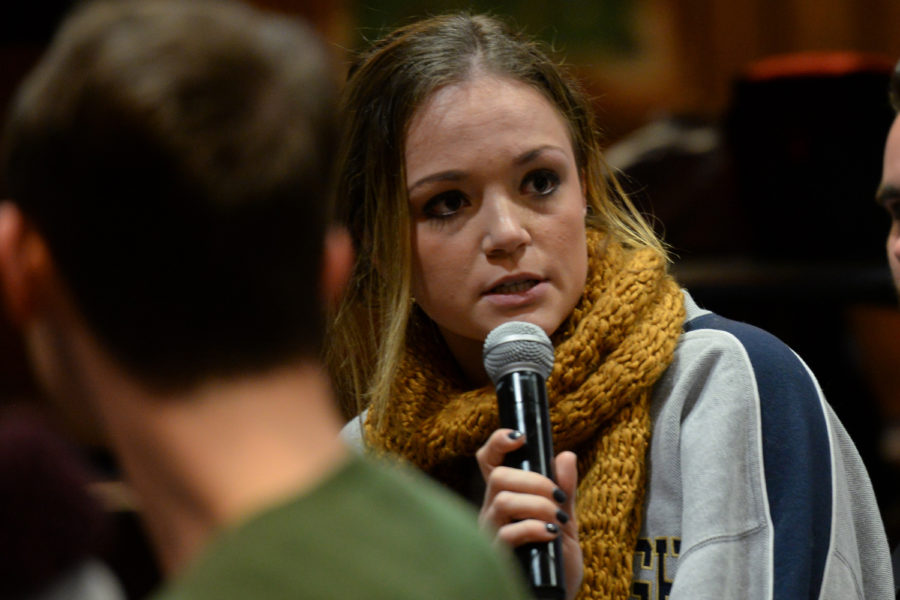Nico Bernstein took issue with the Campus Master Plan presented by Owen J. Cooks Tuesday night at Student Government Board’s weekly public meeting, saying the plan emphasizes athletics and neglects the arts.
“[Cooks] talked a lot about creating new spaces for athletics but not new spaces for students in terms of humanities,” Bernstein said. “I was more interested in just how are we creating space for students and not just for the athletic teams that already have an immense amount of space.”
Bernstein, a senior theater arts and natural sciences major, is president of Performance Collaborative and part of the Red Eye Theater Project. Bernstein recalled noticing neglect in some classrooms he had acting classes in.
SGB’s meeting Tuesday featured a 30-year Master Plan presentation given by Cooks, assistant vice chancellor of planning, design and construction. SGB President Max Kneis set the event up after only seven students attended a student presentation about the Master Plan last Wednesday. But this Tuesday, about 100 students came to discuss and provide their input about topics like crosswalks and student space.
“I know one of SGB’s roles is to really facilitate that student input and grow the student voice on campus, so I saw that we could combine it with an event we already have weekly that we know some students, especially from SGB, are already attending,” Kneis said.
The Campus Master Plan is intended to guide the next 30 years of campus development, and although most students won’t be around to see the changes, Cooks spoke on why current students in the Pittsburgh community should take the plan seriously. It came down to one word — transparency.
“We have all these institutional partners, we have all these community groups and community itself and neighbors and so on,” Cooks said. “I just feel like making sure everyone understands our thinking and informs our thinking is a part of that transparency process, and it’s critical.”
During the presentation, Cooks also discussed the problem of limited student space. He mentioned a recent inventory which revealed only 5 percent of the campus — 210,323 square feet — is currently considered student space. Student space, according to Cooks, is defined as student organization, study and reactional space — including gyms and club sports fields. Cooks said the Master Plan will look to change that.
Eva Gockowski, a sophomore international and area studies major, said there is a limited focus on the facilities for music students.
“If we had better funding for the arts in general, I think that a lot more people would be willing to participate, and then I would be doing shows definitely, [which] in turn could bring in more of a profit than people might expect,” Gockowski said.
Cooks said that one specific student space the plan intends to address is recreation facilities.
“We know that our recreation facilities, as one example, are in poor condition and are inadequate in terms of size and so we are committed to introducing more rec facilities in order to address that,” Cooks said.
The Master Plan, Cooks said, will support of a nationwide initiative to improve pedestrian safety, called “complete streets.” The plan will make Pitt part of the city-wide effort to improve pedestrian safety, possibly resulting in a new crosswalk between David Lawrence Hall and the stairs to the quad.
“Well it’s a safety issue, I guess at its base,” Cooks said. “We wanna make sure pedestrians are safe crossing the street, we wanna make sure bicycles have the ability to get around … We wanna make sure public transportation has [a] route.”
Kneis said that focus groups for students will be themed by different issues. Everyone who attended, signed in and indicated an area of interest will receive an email for future meetings that correspond to the theme they indicated.
“I think at the end of the day we are the prime users of all these spaces,” Kneis said. “Classrooms, students spaces, recreational facilities are primarily intended for students and if we want them to meet our needs we have to share what we need instead of leaving it up to people at the University to think of what we might need.”



